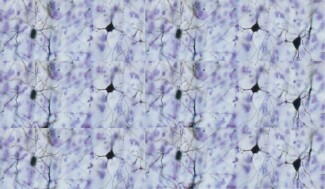A research team from the Paris Brain Institute (Inserm/CNRS/Sorbonne University/AP-HP) just identified mutations in familial cases with early-onset Parkinsonism and intellectual disability. Genetic studies on two affected siblings pairs highlighted for the first time the role of the PTPA gene in early onset motor symptoms. Thanks to cellular and experimental models, researchers were able to show that mutations in the PTPA gene affected the activity of the protein phosphatase 2A, which regulates numerous molecules involved in neurodegeneration. These results, published in the journal Brain, constitute a breakthrough in the understanding of the mechanisms involved in more typical forms of neurodegenerative diseases.
Parkinson's disease is the second most common neurodegenerative disease. It currently affects 150,000 people in France, with number of new cases increasing with aging population.
Parkinson's disease is mainly characterized by the degeneration of neurons, particularly those secreting dopamine, known as "dopaminergic" localized in a very small region of the brain, the substantia nigra.
Aggregates of a protein called α-synuclein, forming Lewy bodies, are associated with the degeneration of neurons and thus with the progressive decrease of dopamine.
The most important risk factor for developing Parkinson's disease is age, with a prevalence of 0.04% in people between 40 and 49 years of age, increasing to 2% in people over 80.
Genetics of Parkinson's disease
Approximately 5% of Parkinson's disease cases are familial, i.e. inherited through dominant or recessive mode.
Several genes of autosomal recessive transmission have been identified. In these families, the risk for a child born from the union of two healthy carriers of the mutation will have a 25% risk of developing the disease.
These genes are mainly responsible for the early onset Parkinson's disease that affect young people.
Early-onset parkinsonism
Prof. Alexis BRICE, Christelle TESSON, Thomas COURTIN and Suzanne LESAGE have led an international collaboration which resulted in the identification of autosomal recessive mutations responsible of atypical forms of juvenile Parkinsonism, associated with intellectual disabilities. The work focused on four patients from two siblings pairs with early intellectual deficits and motor troubles occurring between the ages of 11 and 16, characteristic of Parkinson's.
The genetic study of 1000 patients was completed by cellular and experimental model studies which associated the PTPA gene mutations to a deficit in the activation of the PP2A phosphatase.
These mutations are localized in a gene coding for a PP2A phosphatase regulatory protein. PP2A is very abundant in the nervous system and acts on multiple substrates including α-synuclein. However, the mechanisms by which the decrease in PP2A activity produces Parkinson's disease remain unclear.
These results, beyond the identification of new mutations, open new research avenues on PTPA and PP2A role in more typical forms of Parkinson's disease and pave the way to the identification of new therapies targeting these biological mechanisms.
Sources
PTPA variants and impaired PP2A activity in early-onset parkinsonism with intellectual disability.
https://academic.oup.com/brain/advance-article/doi/10.1093/brain/awac32…







